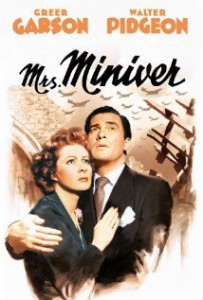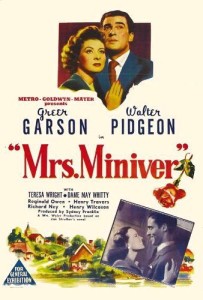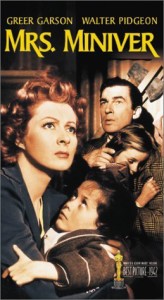Mrs Miniver **** (1942, Greer Garson, Walter Pidgeon, Teresa Wright, Richard Ney, Dame May Whitty, Henry Travers, Reginald Owen, Rhys Williams) – Classic Movie Review 3,128
The 1942 patriotic tearjerker film Mrs Miniver about an English family coping with World War Two won six Oscars, including Best Picture, Best Director, and Best Actress for Greer Garson’s idealised average English middle-class housewife.
Director William Wyler’s famous 1942 patriotic tearjerker film Mrs Miniver about an English family coping with World War Two won six Oscars, including Best Picture, Best Director, and Best Actress for the genteel Greer Garson’s idealised average English middle-class housewife Mrs Miniver, who is married to a noble husband in Clem Miniver (Walter Pidgeon).
The wartime morale-boosting story follows their struggle to survive the first months of the war. While the family is trying to dodge German bombs, the Minivers’ son Vin (Richard Ney) courts Carol (Teresa Wright), the granddaughter of Lady Beldon (Dame May Whitty). And after a rose is named after Mrs Miniver, it is entered in competition against Lady Beldon’s flower.
It also won Best Supporting Actress for Teresa Wright, Best Screenplay for George Froeschel, James Hilton, Claudine West and Arthur Wimperis, and Best Black-and-White Cinematography for Joseph Ruttenberg. There were six other Oscar nominations.
Americans loved it – it was the most popular movie of 1942 – and it is a sincere, beautifully crafted, marvellously effective entertainment and piece of propaganda. Ironically many Brits found the script based on Jan Struther’s novel absurdly unreal and patronising. But Churchill pointed out that it was worth many battleships in propaganda value and it helped to spur the Americans to back the war effort.
German-born Wyler believed the US should join the war against the Nazis, and made a propaganda-driven film to show ordinary Americans what their British equivalents were going through. He hit the jackpot and the film had a profound effect on American sympathy towards the plight of the Brits. Whether as plush entertainment or effective propaganda, it is now a fascinating relic of the time.
Garson hit the headlines for her interminable 30 minute Oscar acceptance speech, forcing a change in the Academy’s rules.
Also in the cast are Henry Travers, Reginald Owen, Henry Wilcoxon, Christopher Severn, Brenda Forbes, Rhys Williams, Clare Sandars, Marie De Becker, John Abbott, Aubrey Mather, Connie Leon, Peter Lawford and Helmut Dantine.
It starts: ‘This story of an average English middle-class family begins with the summer of 1939; when the sun shone down on a happy, careless people, who worked and played, reared their children and tended their gardens in that happy, easy-going England that was so soon to be fighting desperately for her way of life and for life itself.’
It was followed by The Miniver Story in 1950 and the popular star pair returned for Mrs Parkington in 1944.
Garson and Pidgeon appeared in nine movie collaborations): Blossoms In the Dust (1941), Mrs Miniver (1942), The Youngest Profession (1943) in cameos, Madame Curie (1945), Mrs Parkington (1944), Julia Misbehaves (1948), That Forsyte Woman (1949), The Miniver Story (1950), and Scandal at Scourie (1953).
Garson received seven Academy Award nominations, winning for Mrs Miniver.
She is the fourth most-nominated woman for the Best Actress Oscar, including a record-tying (with Bette Davis) five consecutive nominations (1941–1945) in the actress category.
Her nominations are: 1940 Best Actress Goodbye, Mr Chips, 1942 Blossoms in the Dust, 1943 Mrs Miniver, 1944 Madame Curie, 1945 Mrs Parkington, 1946 The Valley of Decision, and 1961 Sunrise at Campobello.
© Derek Winnert 2015 Classic Movie Review 3,128
Check out more reviews on http://derekwinnert.com





